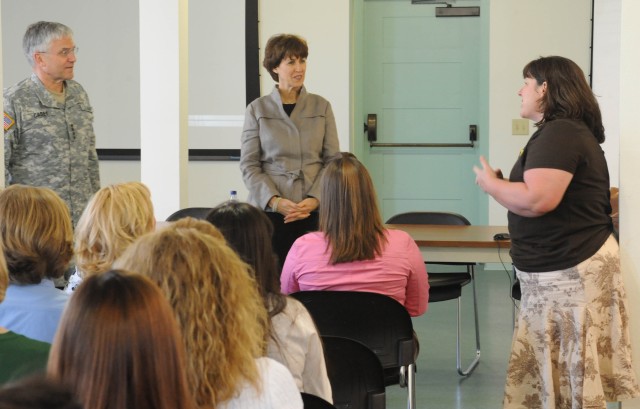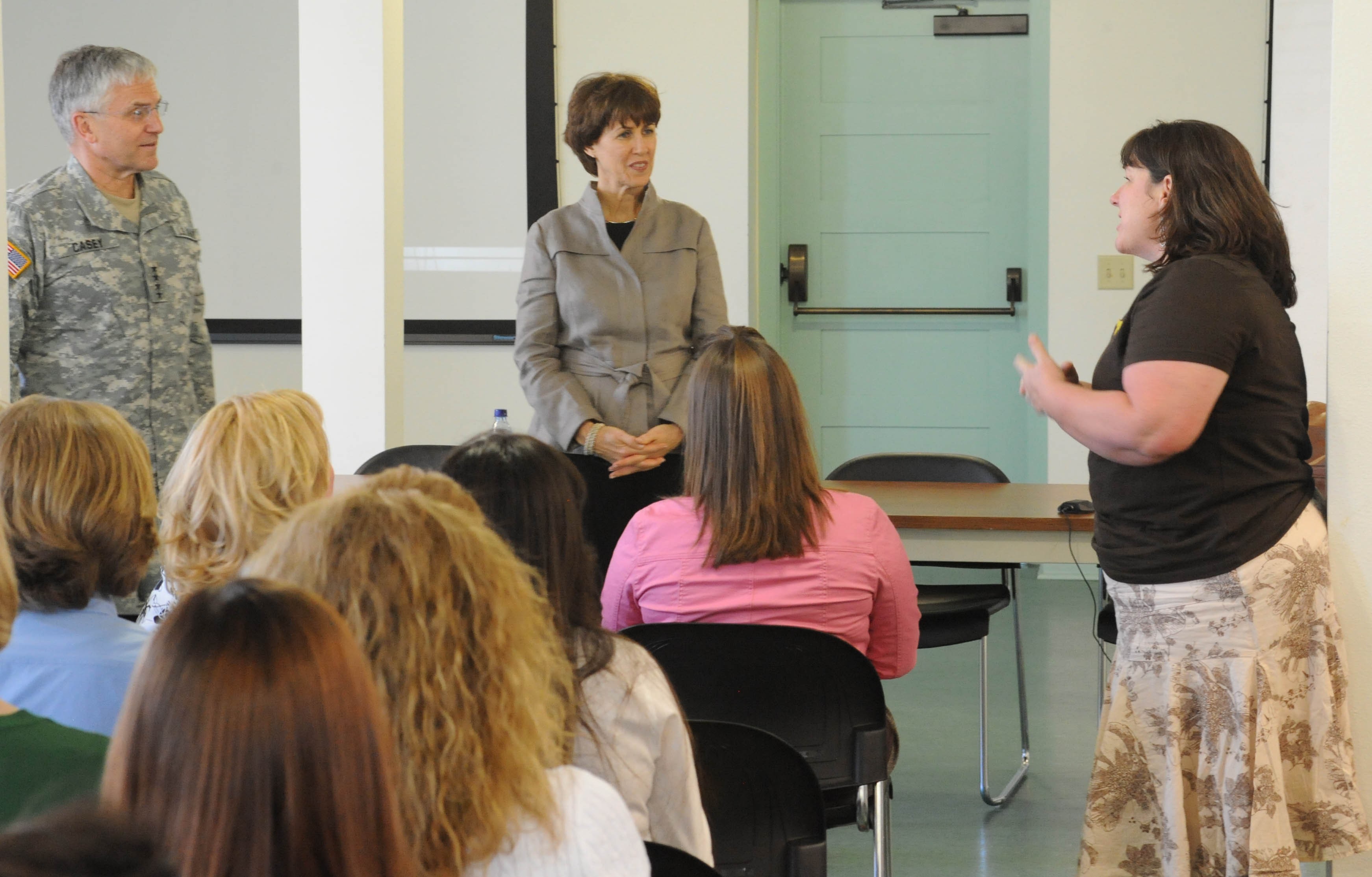FORT CARSON, Colo.-Increasing Soldiers' dwell time between deployments, improving warriors' mental health fitness and enhancing Family programs are top priorities, Army Chief of Staff Gen. George W. Casey Jr. said during a Fort Carson visit May 7.
The Army's top general visited with leaders, Soldiers and Family members to get his fingers on the pulse of how the Mountain Post community was dealing with the stresses and strains associated with the Army's high operations tempo.
Casey said it was evident from his meetings that Fort Carson warriors and Families are "a very resilient group," much like those found throughout the Army.
"But it's clear that they are stressed," he said. Casey noted that the Army has been "out of balance" since he became the 36th Army Chief of Staff in April 2007.
"We are so weighed down by the current demands we can't do the things we know we need to do to sustain this magnificent all-volunteer force," he said during a local press conference.
He said it would be 12-18 months before the proposed drawdown in Iraq begins and "we start seeing substantial increases" in Soldiers' time at home.
"Now, that's the bad news," he said. "The good news is once we start seeing that drawdown, we'll actually get to higher levels of dwell (time) than I thought would have been possible two years ago."
Casey explained that two years ago he thought it would take until 2011 before Soldiers would spend about two years at home in between deployments.
"Now, I think with the drawdown, we'll actually exceed two years (dwell time), which ... is a very positive thing for all of our Soldiers and Families," he said.
He also noted the Army has plans to reduce the duration of deployments. Casey said 15-month deployments are too long, 12-month deployments are too long to sustain over and over again and six-month deployments are too short for the operational environment because "you are just figuring it out and you have to leave."
It will be a couple of years, Casey said, but the Army is looking at nine-month deployments "when the demand comes down sufficiently."
The Army's top general said visiting with Soldiers' spouses provides him a good sense of where the real stressors and strains lie.
"I try to ... see units about 90 days after they get back (from deployment)," Casey said. After 90 days, the honeymoon period is over and, he said, the Soldiers and their Families are faced with the "stark reality" that their Families have been reunited, their vacations are over and the warriors will be deploying again before long.
Casey said he and his wife, Sheila, always meet with Families during their visits because it became clear as they traveled around the Army that the Families "were the most brittle part of the force."
As a result, Army's senior leadership signed the Army Family Covenant in October 2007, pledging to support Families while their Soldiers defend the nation.
"The Soldiers are out doing their jobs, they're doing what they signed up to do and they see themselves making a difference," Casey said, "but (the separation is) harder on the Families back home."
The Army spent more than $1.5 billion each of the last three years on Family programs, doubling it over the last year and will continue that effort, he said.
"It's that important," Casey said. "We say the Army is the strength of the nation. Well, our Families are the strength of our Soldiers."
The Chief of Staff stressed the Army's commitment to raise Soldiers' mental fitness as part of a comprehensive Soldier fitness program, an initiative the service has been working on for the past year. The initiative calls for mental fitness to receive the same level of attention given to physical fitness.
"This program is focused on giving our Soldiers the skill to be more resilient and to enhance their performance," Casey said. "The intent ... is to treat it (mental health) just like physical fitness ... that it's just something you do naturally."
The Army sent its first group of sergeants to the University of Pennsylvania this week to be trained as master resilience trainers.
"We have master fitness trainers ... we are going to train sergeants to be master resilience trainers," he said.
In the fall, the service will employ a periodically-required online self-help test that provides individual feedback and directs Soldiers to modules that will help enhance their performance in their weak areas, he said.
Casey noted there is a misperception that everyone who returns from combat suffers from post-traumatic stress.
"Everyone that goes to combat gets stressed, believe me. But the vast majority of people who go to combat have a growth experience because they are challenged by something very, very hard and they succeed," he said. "This program is based on giving more and more Soldiers the ability to have a growth experience."
Casey said the Army began a concerted effort in the summer of 2007 to eliminate the stigma that seeking mental health counseling has an adverse affects on a Soldier's career. The first step, he said, was a chain-teaching program, where the chain of command reaches out to its subordinates all across the Army.
"We've made pretty good progress," he said, noting currently about 50 percent of the Soldiers have refused help compared to 80-90 percent in the past. "In an Army of 1.1 million people that is still a lot," Casey said. "We have more work to do."
Casey called Maj. Gen. Mark A. Graham, commanding general, Division West (First Army) and Fort Carson, an Armywide leader in the mental health arena. In addition to Graham's initiatives, he said, some of the programs implemented at the Fort Carson drug and alcohol counseling center may soon serve as models for the Army.
Casey concluded his remarks by thanking the Colorado Springs and Pueblo communities for their continued support of the Soldiers and their Families.
"We could not sustain these Soldiers and Families without the support the community provides them," he said.


Social Sharing